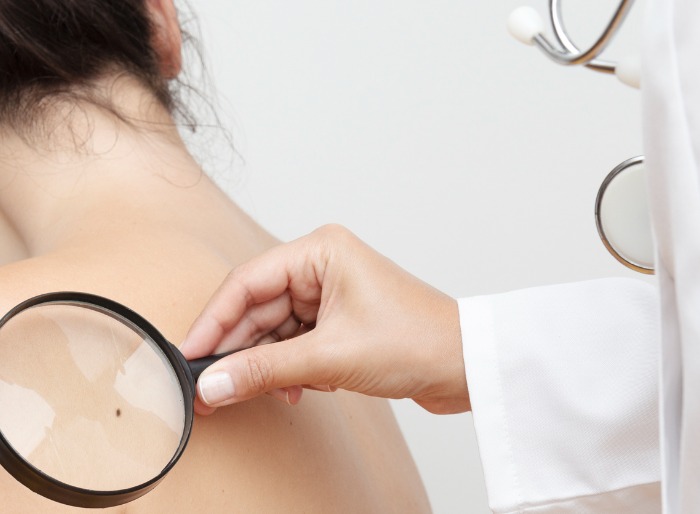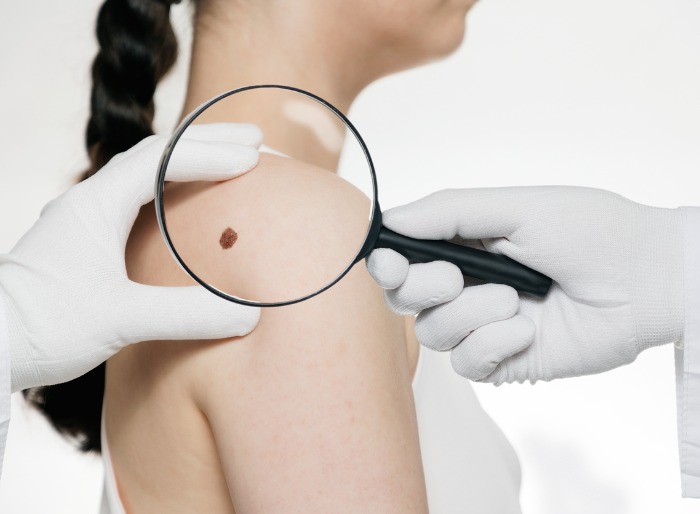Basal cell carcinoma (BCC) is the most common form of skin cancer and one of the most frequently occurring forms of any cancer. Early detection and treatment of basal cell carcinoma are paramount in making a full recovery. If you notice any unexplained spots on your skin, it’s important to have a dermatology associate examine your skin and provide the necessary treatment. If you have any concerns, it’s important to begin prompt treatment and avoid any complications with basal cell carcinoma.
Dermatology Associates is a full-service dermatology practice dedicated to providing the Gainesville community with high-quality cosmetic dermatology and medical dermatology services. Contact us today to schedule an appointment with a dermatologist in Gainesville!

What Is Basal Cell Carcinoma?
Basal cell carcinoma comes from the uncontrolled growth of basal cells, one of the three main types of cells in the top layer of the skin. Basal cells are meant to shed off as new cells grow to replace them, but cell damage can disrupt this cycle and cause BCC. Because it is slow-growing cancer, it is very treatable when caught early. Knowing the warning signs can help in early diagnosis and safe recovery.
What Causes Basal Cell Carcinoma?
Like most skin cancers, basal cell carcinoma is caused by long-term exposure to ultraviolet radiation from the sun or tanning beds. A genetic predisposition can also increase the chances of developing basal cell carcinoma. Avoiding the sun and wearing sunscreen every day is the most effective way to lower your chances of developing basal cell carcinoma.
What Does Basal Cell Carcinoma Look Like?
The issue with relying on self-diagnosis is BCC can appear in different ways, such as open sores that don’t heal, red patches, shiny bumps, whitish or yellowish scars, pink growths, or slightly elevated with rolled edges or an indent in the center. They may sometimes be crusty, itchy, ooze, or bleed. Patients with darker skin may appear brown in color instead of pink, red, white, or yellow. It’s important to monitor parts of your skin that are frequently exposed to the sun or other sources of ultraviolet radiation, such as tanning beds. This includes the face, tops of the head, ears, neck, arms, and shoulders. If you notice any new spots that are not healing or do not go away after a few days, schedule an appointment with your Gainesville dermatologist right away so a medical diagnosis can be made.
Basal Cell Carcinoma Diagnosis
If you notice any basal cell cancer symptoms, such as lesions or sores on your skin that do not heal or go away on their own, schedule an appointment with a medical dermatologist. During your appointment, your doctor will examine the spot and ask you questions regarding your skin, sun exposure, and the extent of your symptoms. Your doctor may also take a sample of the affected area to have tested. During a skin biopsy, a small piece of the lesion will be removed and sent to a lab to be tested. This will tell your doctor whether it is cancerous, and if so, the type and stage the cancer is in to best plan out the next stages of your treatment.
Basal Cell Carcinoma Treatment
When detected early, most cases of basal cell carcinoma can be treated without issue. However, if allowed to grow, the tumor may require Mohs Surgery and/or extensive reconstruction. When left untreated, basal cell carcinoma can be very destructive and in the wrong location can severely damage important functional and cosmetic organs. When diagnosed early, most BCCs can be treated through several outpatient options that leave minimal scarring. Treatments can include the following.
- Topical Medications
- Cryosurgery
- Electrosurgery
- Excisional Surgery
- Mohs Surgery
- Radiation Therapy
- Laser Surgery
Basal Cell Carcinoma Prognosis
The good news is that basal cell carcinoma has nearly a 100% survival rate. The earlier BCC is detected, the better chance it won’t spread and won’t cause extensive scarring or disfigurement. Additionally, if you have had a single instance of BCC, you will likely develop additional BCC or other types of skin cancer, so routine examinations for early detection are important.
